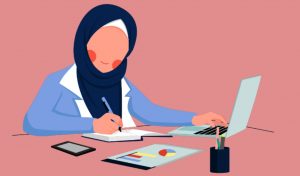How to study effectively: Students have a range of demands and challenges of everyday lives, and it can be tough to concentrate on your academics because of all the competing demands on your time. Even so, if you ever go to school, you’ll have to study to keep up. You’ll need to change your study habits if you ever want to enhance your grades. The key to successful studying is to study intelligently rather than cramming or studying for longer periods.
You can avoid the anxiety and temptation that comes with writing exams by actively developing effective study skills and studying strategies. Mastering effective study techniques will help you achieve your academic goals whether you are in high school or college.
You’ve come to the perfect site if you want to learn how to study effectively. In this case, We’ve detailed how to prepare efficiently for tests and the basic study habits that every student needs to master to excel in their studies in this article.
Recommended: Best time to read and understand effectively
1. Develop a study routine and stick to it: Setting realistic goals and deadlines is a crucial element of having a good daily routine. You will not be driven to complete the assignment on time if you do not have a deadline. Knowing your study habits and keeping track of your grades is beneficial.

Consider the following questions: When and for how long do you typically study? Do you think your grades are satisfactory? Which topics are the most challenging for you? What are your priorities and commitments in your personal life?
Reflecting on these questions will assist you in developing a study strategy, being organized, and focusing on the tasks at hand. A written study schedule (in a calendar or planner) with all of the exam dates and assignment deadlines highlighted is recommended.
Remember that studies have shown that spreading out study sessions over a longer period improves long-term memory. For example, if you have around 16 hours to devote to a subject, it is preferable to devote four hours per week for four weeks rather than cramming all 16 hours into one or two days.
2. Find the right place to study: The most effective place to learn is the library. Your mobile phone will be turned off but still whispering will be allowed. The atmosphere can itself be incredibly motivating. When you’re encircled by a group of determined students who want to learn, you’re most prone to want to become a part of a movement. A good library will also give you all of the study resources you require, including research tools, reference aid, and the chance to request a book for your class. The library can also be a peaceful place where you can study.

If you decide to study at home, be careful to keep all distractions to a minimum (parents, siblings, friends, internet, TV, phone, video games, etc.). Keep your study place tidy so you can think clearly and focus, and you won’t waste time looking for your belongings. Also, working from bed is not recommended because the urge to sleep will be too strong (especially if you are sleep deprived). Rather, invest in a decent, supportive chair that encourages proper posture. Student lounges, study halls, and quiet coffee shops are also viable options, but make sure to select peaceful areas rather than noisy primary meeting spots.
Also see: Countries with the best education system in the world
3. Schedule breaks: The time you plan to begin studying, the times you plan to take breaks, and the time you expect to finish should all be included in your study schedule. Regular breaks in your study routine might help you keep focused on the task and prevent exhaustion. It’s also a great method to give yourself a break from work.

It’s a good idea to take a 5-minute break every 25 minutes, or longer breaks after 90 or 120 minutes of nonstop studying. Overly long breaks (more than half an hour) might lead to the procrastination trap. Also keep in mind that pauses should be utilized for relaxation and recharging, not for completing additional work.
4. Outline and rewrite your notes: The majority of people feel that sticking to a consistent outline structure helps them distill material down to its most basic elements. People find that grouping comparable subjects together makes them simpler to recall when it comes time to take the exam. The most important thing to keep in mind while writing outlines is that they can only be used as a learning tool if they are written in your terms and format. Cognitive psychologists refer to this process as “chunking,” and it is unique to each individual. While you are free to replicate other people’s notes or outlines, make sure you adapt them into your language and notions.

Many pupils struggle to retain crucial information since they don’t do this. When studying, it may also be beneficial to use as many senses as possible, because the information is retained more readily when additional senses are involved. That’s why taking notes is so effective in the first place: it puts information into words and terms you can grasp. Before a major exam, mouthing the phrases out loud while copying the notes is one way to involve yet another sense.
Recommended: How to read for long at night without getting tired or sleepy
5. Use memory games (mnemonic devices): Memory games, often known as mnemonic devices, are strategies for recalling knowledge by associating common terms. People frequently weave words together to create a nonsense statement that is easy to remember. Each word’s first letter can then be used to represent anything else, such as the piece of information you’re attempting to recall.

“Every Good Boy Deserves Fun” is the most used mnemonic device. A music student can learn the five treble clef notes by combining the first letters of each syllable — EGBDF.
The trick to that memory aids is that the new phrase, as well as the sentence you create, has to be more memorable as well as easier to recall than the phrases or information you’re trying to memorize. These aren’t for everyone, well don’t use them if they don’t suit you.
Because remembering visual as well as active imagery uses much more of your brain than remembering a list of items, mnemonic methods are useful. Memory is improved by using more of the brain.
6. Put yourself to the test: Self-testing is a good approach to getting ready for the real thing. Complete a practice test (often supplied by professors or available online) or respond to the questions at the end of each chapter in a textbook. Attempt to explain the material to yourself by reciting it from memory.

It’s a good idea to pretend you’re teaching someone else. Can you share what you’ve learned with others? Verbalizing thoughts and communicating material to others (rather than just reading it) aids in the reinforcement of ideas and knowledge retention.
Also see: Advantages And Disadvantages Of Being a Lawyer
7. Establish a study partner or a study group: Studying alone, especially for prolonged periods, can become tedious for some individuals. Choose a study partner who shares your academic interests, or organize a small study group (preferably no more than 6 people). Studying with others can boost your motivation, give you new views, teach you new study methods, help you fill in learning gaps, and help you learn more quickly. Before the final exam, study groups can also be used as a review session.

8. Sleep: How well you can stay alert is determined by the amount of sleep you get. If you are sleep-deprived, it will be difficult for you to concentrate when studying. Furthermore, your brain uses this period to reactivate and restructure newly learned data while you sleep. Memory consolidation occurs during sleep, specifically through the strengthening of neuronal connections. Specific properties of brainwaves during different phases of sleep are thought to aid in the establishment of specific types of memory.
Recommended: Best Commercial courses to study in the university
9. Turn off all digital distractions: This includes all types of communication, including phone conversations, texts, and emails, as well as social media (Instagram, Twitter, WhatsApp, Snapchat, Facebook, Viber, and other similar platforms). The most effective option would be to put your phone in another room. You could remove the applications and reinstall them later if you can’t stop yourself from being sidetracked.

There are also apps such as Antisocial that can ban social media for a set amount of time. Other apps, such as Freedom or Off Time, can completely disable Internet access for a predetermined period on both phones and PCs. Declare your study period a no-internet, no-device zone.
10. Be positive: It’s sometimes just as important how you approach something as what you do. Believing in oneself is part of having the appropriate mindset. You may feel anxious before tests, and the stress may build as the exam day approaches, but once you sit down and type your answers, it should all become manageable. The main reason for severe exam anxiety is a lack of preparation.

Other reasons include being a perfectionist (anything less than an “A” score is unacceptable), having a poor exam experience in the past, being an anxious person in general, or not feeling well. It will be easier to lessen the stress if you understand what causes your worry. Also, try to prevent catastrophic thinking and full-fledged terror, and, most importantly, begin studying on time.
Recommended: Countries where education is free around the world
1. How do I know what to study?
By piquing our interests, directing our attention, and disclosing what we don’t know, questions can be an effective learning approach. Ask yourself these questions to help you focus on what you should study during your session.
2. What do I already know about this?
If your knowledge base is strong, you can support providing more content. If you don’t have a basic comprehension of terminology or theories and then add more, the study becomes more like a Jenga game, with the tower collapsing due to lacking support. If you discover that your foundation is weak, break down the knowledge you need to know into smaller bits and practice until you can add to it. If you need assistance with concepts, reach out.
3. What do I want to know?
Create a sense of curiosity in yourself and utilize it as motivation. What causes this to happen? Is there anything further that has been written on this? What might happen if this feature were to be altered? You may not be enthusiastic about every subject, but finding a point of interest will help you understand.
Recommended: Most profitable skills to learn in 2022
3. What do I have to know?
What abilities or information are you expected to have as you progress through your class?
How to cram if you must
1. Decide on what you’re going to learn. Use the following rule of thumb: learn new stuff 25% of the time and drill yourself 75% of the time.
2. Make a connection between what you’ve learned and what you already know.
Consider your brain to be a large pegboard on which you may “hook” fresh information to previously learned data.
3. Repeat the recitation several times. This is a test to check if you can remember information from start to finish.
4. Relax: Information is not retained as well in crowded content as it is in material that has been thoroughly evaluated. Relaxation strategies might help you avoid freezing during the exam.
Recommended: How to become an intelligent student at school
Conclusion
The numerous tactics that can be used when learning are referred to as effective study skills. There’s no chance you won’t succeed as a student if you start studying and applying the abilities outlined above. Though most people refer to study skills as study strategies, I’ve collated the methods and classified them under skills that enable you to implement those study strategies. And I hope this essay has been of great assistance to you.

Edeh Samuel Chukwuemeka, ACMC, is a lawyer and a certified mediator/conciliator in Nigeria. He is also a developer with knowledge in various programming languages. Samuel is determined to leverage his skills in technology, SEO, and legal practice to revolutionize the legal profession worldwide by creating web and mobile applications that simplify legal research. Sam is also passionate about educating and providing valuable information to people.